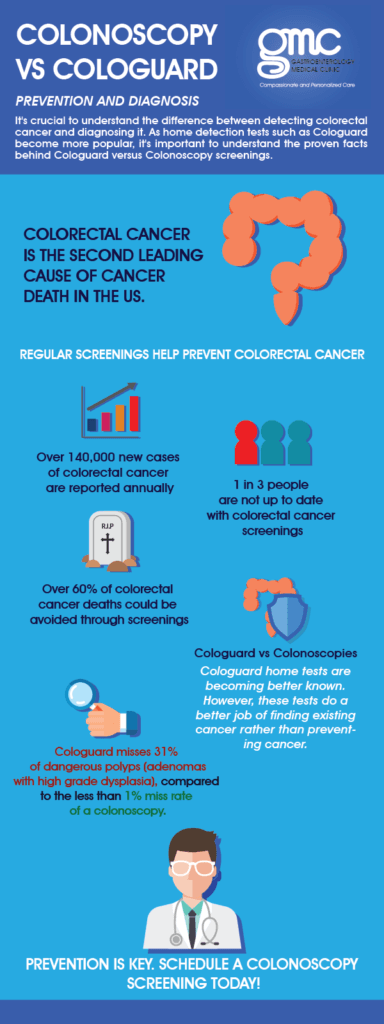
With colorectal cancer as the second leading cause of death from cancer in the United States, prevention is still the key to overcoming this disease. The American Cancer Society reports around 144,000 cases of colorectal cancer every year. With that, there is a need to choose a more effective and tested solution to stop it at its root cause.
In today’s health space, there is a number of rising technologies and solutions to prevent and find colorectal cancer. With 1 out of 3 people unaware of the latest colorectal cancer screening methods available, stopping cancer before it develops is the best possible course of action. Although regular screenings for colorectal cancer is the best way to prevent the disease, it is still important to choose the best possible method that can benefit an individual the most.
What’s the difference between a colonoscopy and Cologuard?

Currently, there is a considerable amount of attention focused on Cologuard. Similar to a FIT(fecal immunochemical test), a Cologuard is a non-invasive and easy to complete test to detect and find cancer. A pivotal clinical study on 10,000 patients reveals that Cologuard has an improved sensitivity when it comes to finding colon cancer compared to a leading FIT.
Cologuard is also known for its advantages over a leading FIT due to a 69% sensitivity for high-grade dysplasia compared to a leading FIT with a 46% sensitivity. However, this only reveals a miss rate of 31% versus colonoscopy’s miss rate of only 1%. Aside from the fact that colonoscopy does a better job of finding cancer, it also does a good job of helping prevent colorectal cancer.
Studies have shown that around 60% of colorectal cancer deaths have been reduced by colonoscopy.
Abnormal growths which may be seen in the colon and rectum during a colonoscopy may be removed during the process. Therefore, a colonoscopy not only detects colorectal cancer better but also helps prevent the progression of the disease at the same time.
This proves that colonoscopy remains as the top choice in detecting cancer and is the gold standard in preventing colon cancer.
The availability of this test at an earlier stage of the disease will not only help prevent the disease from progressing but also allow a patient to consider earlier treatment options to prevent early symptoms from developing into colorectal cancer. Learn more about this method and schedule a colonoscopy screening today!
Frequently Asked Questions
How can I prevent colorectal cancer?
Regular screenings, especially colonoscopy, are the best way to prevent colorectal cancer. Colonoscopy can reduce cancer deaths by up to 60%.
What is Cologuard and how is it different from a colonoscopy?
Cologuard is a non-invasive test for colorectal cancer, but a colonoscopy is more accurate and can also prevent cancer by removing abnormal growths.
How effective is Cologuard in detecting colorectal cancer
Cologuard has a 69% sensitivity for detecting high-grade dysplasia, but it misses 31% of cases compared to colonoscopy, which only misses 1%.
Why is colonoscopy the best method for detecting colorectal cancer?
Colonoscopy detects cancer more effectively and can remove precancerous growths, preventing cancer from developing.
How much can colonoscopy reduce colorectal cancer deaths?
Colonoscopy can reduce deaths from colorectal cancer by about 60% by finding and removing abnormal growths early.
Is Cologuard as effective as a colonoscopy?
Cologuard is good at detecting cancer, but colonoscopy is more effective and can prevent cancer by removing growths during the procedure.
When should I get a colonoscopy screening?
It’s recommended to get a colonoscopy starting at age 45 or earlier if you have a family history of colorectal cancer for early detection and prevention.



